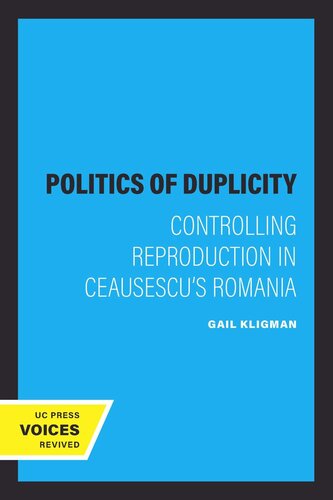

Most ebook files are in PDF format, so you can easily read them using various software such as Foxit Reader or directly on the Google Chrome browser.
Some ebook files are released by publishers in other formats such as .awz, .mobi, .epub, .fb2, etc. You may need to install specific software to read these formats on mobile/PC, such as Calibre.
Please read the tutorial at this link: https://ebookbell.com/faq
We offer FREE conversion to the popular formats you request; however, this may take some time. Therefore, right after payment, please email us, and we will try to provide the service as quickly as possible.
For some exceptional file formats or broken links (if any), please refrain from opening any disputes. Instead, email us first, and we will try to assist within a maximum of 6 hours.
EbookBell Team

0.0
0 reviewsThe political hypocrisy and personal horrors of one of the most repressive anti-abortion regimes in history came to the world's attention soon after the fall of Romanian dictator Nicolae Ceausescu. Photographs of orphans with vacant eyes, sad faces, and wasted bodies circled the globe, as did alarming maternal mortality statistics and heart-breaking details of a devastating infant AIDS epidemic. Gail Kligman's chilling ethnography—of the state and of the politics of reproduction—is the first in-depth examination of this extreme case of political intervention into the most intimate aspects of everyday life.
Ceausescu's reproductive policies, among which the banning of abortion was central, affected the physical and emotional well-being not only of individual men, women, children, and families but also of society as a whole. Sexuality, intimacy, and fertility control were fraught with fear, which permeated daily life and took a heavy moral toll as lying and dissimulation transformed both individuals and the state. This powerful study is based on moving interviews with women and physicians as well as on documentary and archival material. In addition to discussing the social implications and human costs of restrictive reproductive legislation, Kligman explores the means by which reproductive issues become embedded in national and international agendas. She concludes with a review of the lessons the rest of the world can learn from Romania's tragic experience.